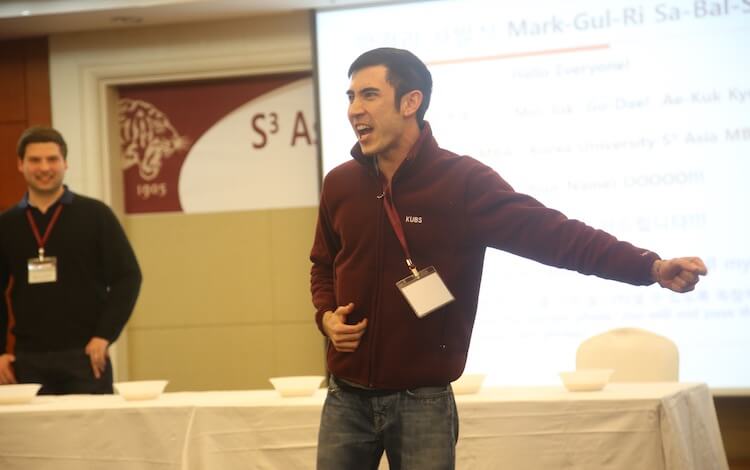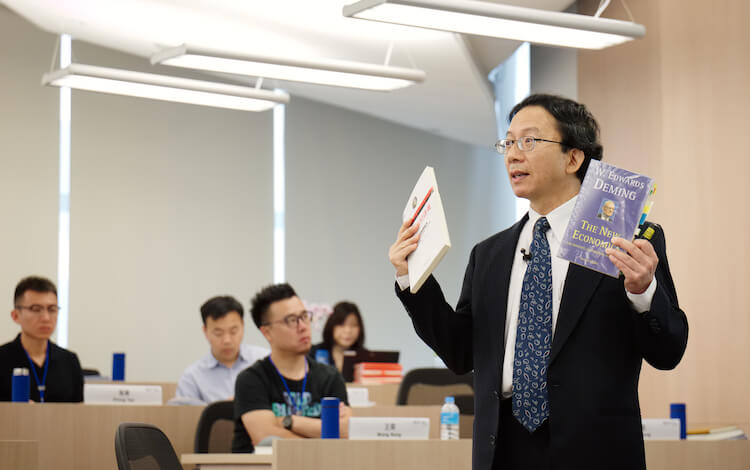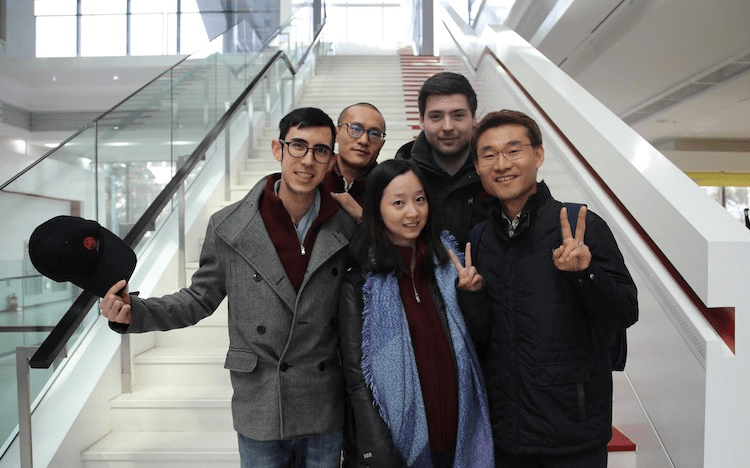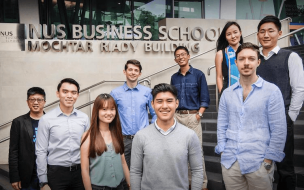Professionals from around the world are keen to witness this unprecedented rate of growth, with the potential to capitalize on its thriving economy, making a career in Asia an increasingly exciting and lucrative prospect.
Cities like Shanghai, Singapore, and Seoul are an exciting gateway into the region for MBA students looking to launch a career in Asia.
But there’s a few things international students need to know before starting their journey in Asia.
Asia isn’t all the same
Grouping Asia together as a whole is impossible.

With close to 50 countries, accounting for 60% of the world’s population, it’s hardly surprising that Asia has a huge demographic and cultural diversity.
“Asia is not a homogeneous region. When people talk about ‘going to Asia’, you’re talking about huge differences if you’re talking about China or Malaysia,” explains Tobias Simanowski, project manager at German automotive company Continental.
Understanding these differences is one of the main principles behind the S3 Asia MBA—on which Tobias was a student—a joint program between the National University of Singapore (NUS) Business School, Fudan University School of Management in Shanghai, and Korea University Business School in Seoul.
Spending a semester at each school, students get a chance to understand the nuances of different Asian cultures and how this affects the way business is done.
“To launch a career anywhere in Asia, you really need to understand these cultural languages and norms, because it’s so multi-ethnic and multicultural,” insists Brian Hwarng, academic director of the S3 Asia MBA.

Business is trust-based
One central cultural practice in many Asian economies is that business is based firmly on trust.
“In Europe or the US, people will do business with companies that have the best products or services,” explains Yann Rebourg (pictured above), an S3 Asia MBA graduate.
“But here in Asia, they will choose the people that they trust the most.”
This places great value on building connections and relationships with people, rather than looking for short-term gains. Students in particular must invest time in networking and getting to know people in the business landscape if they hope to launch a career after graduation.
This trust-based way of doing business really stuck with Yann.
He stayed on for three years in Asia after his graduation, to continue to build his network. Based in Taipei, Taiwan, he set up two businesses—an online platform for actors and models, and a healthy food delivery service.
Now working in France as a consultant at Air France, he has brought this trust-based approach home with him—looking for partners he trusts, not just who will offer him the best price.

There’s a hard working ethic
The rapid growth of Asian economies is no doubt down to the hardworking ethic of its workers.
“People here are very hungry to learn, and therefore they are diligent and willing to endure challenges, because they have the drive to learn and grow,” Brian notes.
This is demonstrated by the great emphasis that governments in China, South Korea, and Singapore place on education—working to establish their academic institutions on a global level.
Compared to 20 years ago, when no Asian schools sat inside the Financial Times Global MBA rankings, these three countries now have 11 top 100 schools between them—including both NUS and Fudan.
MBA students must be prepared for this rigorous approach to work from the get-go in order to get a headstart in business for their post-graduate careers.
It’s worth immersing yourself
As with many experiences in business, you will learn a lot more by doing than by observing.
To understand the cultural differences across Asia, to build relationships, and to demonstrate your willingness to work, immersing yourself in the culture is very worthwhile.
Across three universities in three cities, students have the chance to immerse themselves in different learning and working environments.

Victor Dandanell (pictured right), currently in Shanghai on the S3 Asia MBA, reveals how much he learnt about China, and the way business is done there, from the moment he stepped off the plane.
He went to pay for his first meal with a credit card—and the server demanded he pay through WeChat, the social networking app, instead. It wasn’t a huge inconvenience, but it pointed out the nuances he’d only learn by being there.
“As a foreigner, you can manage without the local language, but it depends on truly immersing yourself in organizations and groups where you have to try to learn as much as possible,” Victor stresses.
Victor was aided greatly through the alumni mentoring program on the MBA, where he was paired with an S3 Asia MBA alum with years of experience in Shanghai. This helped him understand everything from the way of life to the cultural norms and approaches to business.
Something any international student will struggle to succeed without.
Student Reviews
National University of Singapore - NUS Business School
Emma
10/12/2022
Blended
marvellous
I have studied at the top university in the world and it was no doubt an overwhelming experience for me. I have gained skills as well as knowledge and it was the aim of this institute to give the insight of the skills besides theoretical learning.
Inayat
27/11/2022
On Campus
My journey at University of Singapore
1. In my opinion, the library (actually the library) was a great resource and facilitated a great learning environment. 2nd The professors and tutors were knowledgeable in their respective fields and were happy to help and involve students who visited them outside of class. 3. The students themselves were involved in each program in very different ways. You can meet everyone from lazy people to studious people. In my experience, students were motivated by grades and sheer intellect. 4. A myriad of extracurricular activities and facilities were available at a very low cost. 5. Academic performance is rated very high. when I applied to college S., my NUS transcripts had to be standardized in order for them to assign me a US GPA. During this conversion all C's were converted to As
Student
20/11/2022
On Campus
Prestigious university - learning is in your hands
Pros: - Great branding (one of the top universities in Southeast Asia) - Relatively easy coursework (As a business major, I spend about a third of my week studying and the rest working) - Qualify under the High Potential Individual visa that UK is handing out (all NUS students can apply to get a visa to work/ live in the UK for 2 years). I don’t expect NUS to be removed from this list any time soon given it’s reputation. Cons: - Lack flexibility in coursework (committing upfront on the major you are taking from matriculation
Student
17/06/2019
Great opportunities,
Perhaps the best part of NUS is the vast amount of opportunities it affords it's students. It's almost as if every week there's a new career fair, industrial visit, hackathon, or any other competition or event for it's students to join. NUS also offers multiple exchange programs ranging from 3 to 12 months (see the NOC programme) to grant it's students a more international outlook upon their graduation. There is a general atmosphere here that employability isn't an issue once we graduate. It's just unfortunate that it seems most students don't utilize these opportunities the best they can, but this attitude is simply a by-product of the results-oriented education system in Singapore that can be chalked up to the lack of diversity in the student body beyond Singaporeans. Perhaps bringing in more international students will help skew the results-focused nature of academics at NUS to a focus on more holistic education and development - what I personally believe a university education is really worth. However, with the right mindset and attitude, I believe NUS can truly offer a world class education, provided you're willing to put in the extra effort.
Student
5/10/2017
A dynamic and inter-disciplinary experience, that nurtured a love for learning
Coming from the Faculty of Arts and Social Sciences, what I greatly enjoyed was the sheer breadth of courses available within the faculty and encouragement to take courses outside our faculty as well. Courses were always engaging, and professors and lecturers often gave students the freedom to pick topics for their final term papers or presentation and exercise creativity - for example, my interest in Art History meant that I could often delve deeper into this interest in my main academic leanings of Political Science and History. Professors and lecturers made themselves readily available to the students, and were approachable. During my time in NUS, there was a noticeable effort to invest in the students' global experiences (Exchange Programmes, Summer School, NUS Overseas College) - I truly believe that NUS was sincere in allowing as many students to have overseas experiences in spite of financial capabilities, and if one made the effort, the Centre for Future Ready Graduates was useful and invested in the potential careers of students too. When a friend from another local university did a local exchange to NUS, he remarked that NUS students truly loved to learn. I was content being surrounded by people who pursued their Arts/Social Sciences disciplines with a love for the content. It is also dynamic to be in a university that simply has so many different disciplines and faculties - one is just surrounded by people of varying interests and experiences, and forces them to look beyond their majors. Of course, NUS is commonly known for being too theoretical and content-focused. This is up to the students' prerogatives on how they want to exact their education and mould it for their lives, but generally NUS feels comfortable and safe within the academic realm - there is no push towards internships or whatnot that other universities might focus on. This could be a con. Another thing I did not like about NUS in recent times was the blatant grade inflation - that juniors from the 2014/5 batch could have liberties to S/U a lot more modules than their seniors could in some bid to take the focus away from grades, and towards learning and experimenting. Nevertheless, I greatly cherished my time in NUS and would highly recommend it.
Student
31/05/2019
Transportation
There is an issue of overcrowding during peak hours such as before morning class and lunch time. This results in uncomfortable travelling experience for many students, it also becomes dangerous when the drivers make steep turns and brakes suddenly.
Heda
5/02/2024
On Campus
never ending accademic excellence
Considering various aspects of my university experience, here is my review as a student at National university of Singapore. NUS is highly ranked globally and has a strong reputation for academic excellence across a wide range of disciplines. The school attracts a diverse student body and offers an international perspective through its academic programs and exchange partnerships with other universities. NUS boasts modern facilities, including libraries, laboratories, and recreational spaces. Accommodation is spacious. However, due to its high reputation, admission to NUS can be highly competitive, making it challenging for some students to gain entry. Singapore is known for its high cost of living, and this may pose a challenge for students on a tight budget, especially those coming from lower-income backgrounds. International students may face a period of adjustment to a new cultural and social environment when studying at NUS.
Tian
5/02/2024
On Campus
rigorous yet a nurturing academic environment
As a student at the National University of Singapore NUS, I have found it to be a vibrant and diverse institution with a top-notch faculty. The faculty are not only knowledgeable but also approachable and supportive of students' academic pursuits. For me the University is rigorous yet a nurturing academic environment. The student life is rich with clubs and activities, and the accommodation options are comfortable and safe. While tuition fees may vary, there are numerous financial aid and scholarship opportunities available. Overall, NUS offers a well-rounded university experience with modern facilities and a strong emphasis on global engagement. Overall, my experience at NUS has been enriching, and I highly recommend it to anyone seeking a world-class education in a dynamic and inclusive environment.
Gong
19/02/2024
On Campus
high cost of living
The cost of living at the National University of Singapore (NUS) is quite high for Chinese citizens, especially when compared to living expenses in China. Accommodation, food, and transportation expenses are significant, with rent for a room in on-campus housing ranging from S$400 to S$1000 per month. While there are affordable food options on campus, dining out can be expensive. However, the quality of education at NUS is excellent, with top-notch faculty and resources available to students. The university ranks among the best in Asia and offers a wide range of programs, ensuring a high standard of education. As for student life, NUS has a vibrant campus with numerous clubs, societies, and events to cater to various interests. Chinese students can find a sense of community through cultural groups, while also engaging in activities with local and international students. Overall, despite the high cost of living, NUS provides a diverse and enriching educational experience for Chinese students.
Joel
19/02/2024
On Campus
dedicated staff
I am a local student studying at the National University of Singapore, I can confidently say that this institution truly lives up to its reputation as one of the best universities in the world. What I appreciate the most about NUS is the quality of education that is offered here. The professors are dedicated to helping students succeed. The curriculum is rigorous and challenging, but it is also very rewarding as it equips us with the knowledge and skills. I really lik the campus itself. It is well-maintained and equipped with state-of-the-art facilities. The campus is also vibrant and bustling with various activities and events. Furthermore, NUS has a strong emphasis on research and innovation, which is evident in the many groundbreaking research projects that are being conducted here. As a student, I feel proud to be part of an institution that is at the forefront of pushing boundaries and making significant contributions to various fields of study.
Shao
21/02/2024
On Campus
dynamic student population
The diverse and dynamic student population at the National University of Singapore greatly enriches the overall academic experience for me. Interacting with peers from different cultural backgrounds and perspectives broadens my understanding of the world and fosters a truly global mindset. The diverse student body also creates a vibrant campus environment, with a plethora of cultural events, clubs, and activities that cater to a wide range of interests. This diversity not only enhances the social aspect of student life but also promotes collaboration and innovation in academic pursuits. The varied perspectives and experiences of my classmates challenge me to think critically and approach problems from different angles, ultimately contributing to a more holistic and well-rounded education.
Zhang
21/02/2024
On Campus
numerous opportunities
Studying at the National University of Singapore has been a mind-blowing experience. The rigorous curriculum challenges me to think critically and expand my intellectual horizons. The professors are world-renowned experts in their fields, providing unparalleled guidance and mentorship. The campus is vibrant and conducive to learning, fostering a sense of community among students. The numerous opportunities for research and extracurricular activities have enriched my academic journey. Overall, my time at NUS has been both challenging and rewarding, preparing me for a successful future. I recommend the university to other students
Lee
23/02/2024
On Campus
expert faculty
I can confidently say that I am proud to be part of such a prestigious institution. NUS offers world-class education with top-notch facilities and resources. The professors are experts in their field and are dedicated to helping us succeed. The campus is beautiful and conducive to learning, with a vibrant student life that offers numerous clubs and activities to get involved in. However, there are some drawbacks to attending NUS. The workload can be overwhelming at times, with heavy course loads and demanding assignments. Additionally, the competitive nature of some programs can create a stressful environment for students. The bureaucracy and red tape can also be frustrating, making it difficult to navigate certain administrative processes. I recommend NUS because it is a fantastic university that provides a high-quality education.
Shreya
4/03/2024
On Campus
Affordablility and quality
I have discovered the university to be relatively affordable compared to other top institutions around the world. The application process was not hectic, and there are scholarship opportunities available for students in need of financial assistance. Enrolling at the university was an easy process, with helpful staff guiding me through each step. The tuition fees are worth the quality of education provided. The university offers world-class facilities, renowned professors, and a diverse range of courses that prepare students for success in their chosen fields.
Isaac
4/03/2024
On Campus
enthusiastic school spirit
I am confident in the career success opportunities that the university provides. NUS has a strong network of alumni and industry connections, making it easier for students to secure internships and job placements. The tuition costs at NUS are reasonable compared to other top universities, and there are various scholarships available for both local and international students based on merit and financial need. School spirit at NUS is strong and enthusiastic, with numerous student organizations and clubs to join. The campus is always buzzing with events, workshops, and activities that foster a sense of community and belonging. As a student, I have had the opportunity to gain valuable work experience through internships and research projects, which have enriched my academic learning and prepared me for the workforce.
Maria Vazquez
4/03/2024
On Campus
global recognition
the examination style at NUS emphasizes critical thinking and application of knowledge rather than rote memorization. The university's rigorous assessment methods challenge students to demonstrate their understanding and analytical skills, preparing them for real-world scenarios. NUS is globally recognized and accredited, ranking as one of the top universities in the world. This accreditation ensures that the degrees and programs offered by NUS are of high quality and recognized internationally, providing students with a competitive edge in their future careers. The university offers a wide range of programs across various disciplines. These programs are taught by renowned faculty members. Accommodation options at NUS are comfortable and convenient, with on-campus residences and off-campus housing options available for students. The university also provides a reliable and efficient transport system, making it easy for students to commute to and from campus.
Tei
4/03/2024
On Campus
campus look and feel
As a student at the National University of Singapore, the academics here are top-notch. The professors are highly knowledgeable and dedicated, and the coursework is challenging yet rewarding. The campus is located in the vibrant Kent Ridge area, surrounded by lush greenery and stunning architecture. The food options on campus are diverse and delicious, ranging from traditional hawker fare to international cuisines. There are also plenty of cafes and eateries off campus, so you'll never run out of dining choices. In terms of getting around, NUS has a well-connected shuttle bus service that makes it easy to travel between different parts of the campus. Additionally, there are plenty of public transportation options nearby, including buses and the MRT.
Xu
4/03/2024
On Campus
students taking control
I am impressed by the numerous student leadership roles available on campus. From student clubs and organizations to residential hall councils, there are ample opportunities for students to take on leadership positions and contribute to the university community. Moreover, the university encourages peer-to-peer support through programs like peer tutoring, study groups, and mentorship initiatives. The quality of education at NUS is exceptional, with knowledgeable faculty members, innovative teaching methods, and cutting-edge research opportunities. The university's rigorous academic standards challenge students to excel and think critically, preparing them for success in their fields. Lastly, student life at NUS is vibrant and diverse. From cultural festivals and sports events to academic conferences and community service projects, there is never a dull moment on campus.
Tong
4/03/2024
On Campus
different support services
National University of Singapore offers a wide range of support services to help students succeed in their studies. Firstly, there is academic support in the form of study skills workshops, tutorial classes, and academic advisors who provide guidance on course selection and career planning. The university also has a well-equipped library with academic resources and study spaces. In terms of personal support, the university has counseling services and support groups for students facing mental health issues or personal challenges. There are also campus health services and a student wellness center that promote physical and mental well-being. Additionally, the university offers financial aid and scholarships to students in need, as well as career services to help students secure internships and job opportunities. The university also organizes networking events, industry talks, and career fairs to connect students with potential employers.
Goettle
2/04/2024
On Campus
Exchange students
As an exchange student at the National University of Singapore (NUS), I have had an incredible experience studying at this prestigious institution. The university offers a wide range of courses taught by world-renowned faculty members. The campus is modern and vibrant, with excellent facilities and resources available to students. NUS also provides numerous opportunities for cultural immersion and exploration through student organizations, events, and international exchange programs. They have Diverse and high-quality academic programs, World-class faculty members. However Large class sizes in some courses, Competitive academic environment, Cost of living in Singapore can be high and Limited interaction with local Singaporean students outside of classes can be a burden.
Savani
24/09/2024
On Campus
student exchange program
As a student at NUS, I can confidently say that the student exchange program here is one of the ultimate highlights of my academic journey. The opportunity to study abroad and experience different cultures is invaluable. NUS has partnerships with numerous prestigious institutions worldwide, allowing students to choose from a diverse range of countries. The application process is straightforward, and the support from the international office is exceptional. During my exchange in Europe, I made lasting friendships and gained new perspectives on my field of study. The experience not only enriched my academic knowledge but also helped me develop personally. If you have the chance to participate in an exchange program, I highly recommend it. It’s an experience that truly broadens horizons and enhances your education in ways that classroom learning alone cannot achieve.
Yuyan
17/09/2024
On Campus
Large campus and its facilities
Singapore National University (NUS) is a sprawling campus that never ceases to impress. The sheer size of the university allows for a variety of top-notch facilities. The gyms are well-equipped, catering to both casual exercisers and serious athletes. The swimming pool is an oasis for relaxation and fitness, with clean and modern amenities. Transport around the campus is exceptionally convenient with a reliable shuttle service, bike rentals, and proximity to public transit options. Navigating the large campus is manageable due to clear signage and helpful maps. the extensive facilities greatly enhance the student experience, making NUS not just a place of learning but a community that supports a balanced and active lifestyle.
Chew
17/09/2024
On Campus
Academic experience
The academic experience at NUS is outstanding. Classrooms are designed with a focus on functionality and comfort, equipped with modern technology that supports interactive learning. Class hours are structured to maximize learning while allowing flexibility, and the schedule accommodates various extracurricular activities. The faculty is highly knowledgeable and approachable, fostering a stimulating academic environment. Professors are not only experts in their fields but also dedicated mentors who are genuinely invested in student success. The academic rigor combined with the supportive teaching staff makes NUS an ideal place for intellectual growth and academic achievement.
Wang
16/09/2024
On Campus
intellectual growth
I’m a second-year Arts and Social Sciences student at NUS, and the university has been an eye-opening experience. The diversity of the student body enriches classroom discussions and provides different perspectives. I’ve particularly enjoyed the interdisciplinary approach to learning, which allows me to explore various subjects beyond my major. The campus offers beautiful green spaces, perfect for relaxing between classes. However, the frequent group assignments can sometimes feel like they add pressure, especially during peak periods. On the social side, there are plenty of events and cultural festivals that make campus life vibrant. NUS is an excellent place for intellectual growth and cultural exchange.
Erin
2/09/2024
On Campus
Employment on campus
Life at NUS is vibrant and full of opportunities, though it comes with some challenges. Employment on campus is limited, which can be a drawback for those seeking part-time work. On the upside, leisure activities are plentiful, with various clubs and events enhancing student life. The campus transportation system is efficient, with frequent shuttle buses and well-maintained bike paths. Canteens offer a wide variety of food options, though they can get crowded during peak hours. while there are some areas for improvement, the campus environment is generally conducive.
Lim
30/10/2024
On Campus
exchange programs with top universities
The National University of Singapore has been an ideal choice for me. Academics are intense, but the faculty here ensures a world-class education, blending theory with real-world applications. The campus is gorgeous and green, offering plenty of spots for study breaks or catching up with friends. Scholarships are competitive but accessible, with financial aid options that make it feasible for international students to study here. Student housing is comfortable, though it can be a bit pricey. NUS’s prime location gives us access to Singapore’s vibrant nightlife and multicultural events, perfect for unwinding. The university also has robust exchange programs with top universities worldwide, adding to the global experience. With its impressive alumni network and career support, NUS is an excellent investment in one’s future.
Ang
15/11/2024
On Campus
Inclusivity and cultural diversity
I was impressed by the university's commitment to inclusivity and cultural diversity. The vibrant campus life made it easy to integrate, and there are numerous student clubs catering to various interests. The teaching staff is approachable, and their focus on innovation and research has been a highlight of my experience. The university provides ample resources, such as well-equipped libraries and modern lecture halls. However, the competitive atmosphere can be overwhelming at times, and it requires good time management skills to cope. Despite the challenges, I would highly recommend NUS for its excellent academic reputation and dynamic campus life.
Umar
28/11/2024
On Campus
Being a foreign student
NUS is a fantastic choice for students seeking an internationally recognized education. The emphasis on practical learning and internships makes it stand out for me from many other universities. The campus location in Singapore is perfect, with easy access to cultural landmarks and entertainment. I thoroughly enjoyed the elective modules, which allowed me to explore subjects outside my major. However, I found the administrative processes to be slow and sometimes frustrating. That said, the vibrant student community and excellent support for entrepreneurship outweigh these minor inconveniences. I’d recommend NUS to anyone aiming for a global career.
Muhammad
14/01/2025
On Campus
Residential College system
The National University of Singapore is a fusion of academic rigor and a vibrant multicultural experience. One of its unique highlights is the “Residential College” system, where students not only live but also learn within themed communities focused on areas like sustainability or leadership. The location of the campus is another gem—it blends seamlessly into the city’s urban landscape, giving students access to cutting-edge research labs and local cultural hubs within minutes. What sets NUS apart is its dedication to real-world problem solving, exemplified by its “Global Innovation Alliance” that places students in entrepreneurial hubs worldwide. Another underrated feature is the Kent Ridge Canopy Walk, a tranquil escape from the fast-paced academic life, allowing students to reconnect with nature. NUS fosters not just intellectual growth but also emotional resilience, preparing students for global challenges with a rooted sense of identity.
Aislinn Nyssa
7/02/2025
On Campus
interdisciplinary learning
NUS is a powerhouse, and it’s not just about academics—it’s a lifestyle. The campus is stunning, with lush greenery and state-of-the-art facilities. One thing that stands out is the emphasis on interdisciplinary learning. For example, I’m a business student, but I took a module on Southeast Asian art history, which completely changed my perspective. The residential college system is another highlight; I live in Tembusu College, where dinners often turn into heated debates about everything from AI ethics to hawker food culture. The food scene here is incredible—NUS has its own hawker center! But it’s not all perfect. The workload is intense, and the humidity can be brutal when rushing between classes. Still, the connections I’ve made and the global exposure I’ve gained make it worth it.
Xu
5/02/2025
On Campus
advanced technologies and research
Studying at NUS feels like being at the heart of innovation. The campus is a city in itself, with cutting-edge labs, startup incubators, and breathtaking libraries. I once joined a research project at the Centre for Quantum Technologies, and the exposure was unreal. The competition is tough—everyone here is driven—but that pushes you to be better. The best part? The late-night discussions at UTown Starbucks, where we debate everything from AI ethics to hawker center rankings. If you want world-class education with a Singaporean twist, NUS is the place.
Chen
3/02/2025
On Campus
shoosing NUS
Choosing the National University of Singapore means choosing a university that prioritizes both academic rigor and innovation. NUS is known for its interdisciplinary approach—students are encouraged to step outside their majors and explore different fields, whether through the flexible curriculum or industry collaborations. The learning experience is dynamic, with a strong emphasis on research, problem-solving, and real-world applications. The Start-up Incubation Program is particularly attractive for aspiring entrepreneurs, providing mentorship and funding to students with big ideas. Campus life is diverse and exciting, with plenty of student organizations, cultural events, and networking opportunities. The food scene on and around campus is unbeatable—hawker centers offer a wide range of affordable and delicious meals. The university’s location in one of the most innovative cities in the world makes it a great place for career development, with multinational companies actively recruiting students. Overall, NUS offers a unique and rewarding university experience.
Alicia
2/02/2025
On Campus
Global university
The National University of Singapore is a world-class institution that blends academic excellence with cutting-edge research and a strong entrepreneurial spirit. The university is consistently ranked among the best in Asia, and it’s easy to see why—the faculty includes top experts in various fields, and the facilities are nothing short of exceptional. The Kent Ridge campus is massive, with everything from advanced research labs to innovative learning spaces. Beyond academics, NUS has a fantastic residential culture, with student hostels fostering a tight-knit community. The multicultural environment is one of its strongest aspects—you meet people from all over the world, creating an intellectually and socially stimulating experience. Singapore itself is an exciting place to live, offering safety, incredible food, and a gateway to travel across Asia. NUS encourages students to think globally, with exchange programs and internship opportunities that help graduates stand out in the job market.
Nachimuthu Kumar Nanthana
9/02/2025
On Campus
Dreams and Opportunities
Studying at NUS has been a dream come true. The opportunities here are endless—from internships at top companies to research projects with renowned professors. For example, I’m currently working on a research project about renewable energy storage, which aligns perfectly with my ambition to work in sustainable energy. One challenge has been adapting to the fast-paced environment, but the friendships I’ve made and the support from my peers have made it easier. I expected a competitive atmosphere, but the reality is that while the standards are high, the sense of camaraderie among students is even stronger. NUS has not only met but exceeded my expectations in every way.
Paul Renner
13/02/2025
On Campus
global academic community
Studying at NUS has been a rewarding yet challenging experience. The university's facilities, such as the library and student common areas, are excellent, providing a comfortable environment for both study and relaxation. Tuition fees are on the higher end, but it’s balanced by a range of scholarships based on merit or financial need. I’ve found the student experience to be quite enriching – NUS encourages active participation in both academic and extracurricular activities. The campus culture is diverse, with students from all over the world. However, the cost of living in Singapore can be high, especially for accommodation, so it’s something to plan for. NUS is a great choice for students who are driven and want to be part of a global academic community.
Wee Liang
16/02/2025
On Campus
A Prestigious University with Global Recognition
NUS is a world-class university known for its rigorous academic programs and strong industry connections. The curriculum is designed to challenge students and encourage independent research. Professors are leaders in their fields, providing insights that go beyond textbooks. The campus is equipped with top-tier facilities, including cutting-edge research labs and libraries. Singapore itself is an ideal place for students, offering safety, efficiency, and a dynamic business environment. However, the workload is intense, and students must manage their time effectively. Tuition fees can be expensive, but scholarships and financial aid options are available. The strong reputation of NUS ensures excellent job opportunities after graduation. If you want a degree that holds value globally, this is the place to be.
Yu
25/02/2025
On Campus
A Global Leader in Education
The National University of Singapore (NUS) is an institution that blends academic excellence with real-world opportunities. From cutting-edge research facilities to industry partnerships, NUS provides students with the skills needed for success in a rapidly evolving world. Professors here are top experts in their fields, ensuring that lectures are both engaging and relevant. The campus itself is breathtaking, with a perfect balance of modern infrastructure and green spaces, creating an ideal learning environment. Additionally, NUS fosters a strong global network, allowing students to connect with peers and professionals from around the world. Whether you’re interested in technology, business, or humanities, this university offers unmatched resources and career prospects.
Patrick
28/02/2025
On Campus
Innovative space
The National University of Singapore is a powerhouse of innovation and research. As a student here, I’ve had the opportunity to engage in cutting-edge projects that push the boundaries of knowledge. The university’s emphasis on interdisciplinary learning has allowed me to explore subjects outside my major, enriching my academic journey. One of the highlights of my time at NUS has been participating in the annual NUS Enterprise Challenge, where students pitch their startup ideas to industry leaders. On the flip side, the competitive atmosphere can be overwhelming. Many students feel the pressure to excel academically, which can lead to burnout. Additionally, while there are numerous clubs and organizations, finding the right fit can be challenging, especially for those who are introverted. It’s essential to take the time to explore different groups and find a community that aligns with your interests. Despite these challenges, NUS is an incredible place for those who are passionate about learning and innovation.
Liang
27/02/2025
On Campus
A great choice to study
In my opinion as a student here, The National University of Singapore is a world-class institution that truly lives up to its reputation! As a student here, I have been amazed by the cutting-edge research opportunities, highly qualified professors, and diverse student body. The campus is stunning, blending modern facilities with lush green spaces, creating an inspiring atmosphere for learning. NUS also provides strong industry connections, ensuring that students gain practical experience and excellent career prospects. Whether you’re into technology, business, or social sciences, NUS offers an outstanding education that prepares you for the global stage. Highly recommended
Lee
11/03/2025
On Campus
A Hub world class Excellence
The National University of Singapore is a truly world-class institution, but it’s the unique approach to teaching and learning that sets it apart. One of the aspects that I didn’t fully appreciate before coming here is how strongly NUS encourages interdisciplinary learning. Whether you’re studying engineering, business, or arts, there’s an emphasis on blending these disciplines to tackle real-world challenges. The campus is a paradise for tech enthusiasts, with cutting-edge facilities like smart classrooms and research labs that allow students to explore their passions to the fullest. What really stands out, though, is the entrepreneurial spirit that permeates the entire university. NUS offers a host of initiatives to support students who want to turn their ideas into reality, from incubators to mentorship programs. It’s a university that not only prepares you academically but also shapes you to become a leader in today’s fast-paced, interconnected world.
Brendan
13/03/2025
On Campus
A Forge of Excellence and Resilience
Stepping into the National University of Singapore feels like entering a crucible where raw ambition is refined into brilliance. The academic rigor here is not for the faint-hearted—it’s a relentless whirlwind of lectures, projects, and deadlines that pushes you to your intellectual limits. Yet, this intensity is what makes NUS extraordinary. The professors are world-class, blending theoretical depth with practical insights, and the diverse student body creates an electrifying exchange of ideas from every corner of the globe. The campus itself is a microcosm of innovation, with state-of-the-art facilities that make you feel like you’re on the cutting edge of discovery. But make no mistake—this is not a place for complacency. The competition is fierce, the workload daunting, and the expectations sky-high. However, if you’re willing to embrace the grind, NUS rewards you with unparalleled opportunities, from global internships to groundbreaking research.
Trestan
13/03/2025
On Campus
Dreamers are achievers
At NUS, every day feels like stepping into a kaleidoscope of cultures and aspirations. With students and faculty hailing from over 100 countries, the campus buzzes with perspectives as varied as the city-state it calls home. This diversity isn’t just cosmetic—it’s woven into the fabric of academic life. Group projects become global think tanks, and casual conversations turn into lessons in cultural diplomacy. But beyond its cosmopolitan charm lies an institution that demands everything you’ve got. The curriculum is as intense as it is rewarding, designed to prepare you for a world that waits for no one. Yet, amidst the rigor, there’s room for exploration—be it through vibrant student societies, cultural festivals, or cutting-edge research labs. The city of Singapore itself becomes an extension of the classroom, offering lessons in innovation and resilience at every turn. NUS isn’t just a university; it’s a launchpad for dreams. It challenges you to think bigger, work harder, and embrace discomfort as a catalyst for growth. If you’re looking for a place that will stretch your limits while broadening your horizons, NUS will not disappoint.
Zoha
17/03/2025
On Campus
A Transformative Year Abroad
My exchange year at NUS was life-changing. It broadened my horizons and taught me resilience in adapting to new environments. The competitive atmosphere at NUS was challenging but rewarding—it pushed me out of my comfort zone academically and socially. Smaller classes were particularly engaging as they allowed for deeper discussions with professors who were passionate about their subjects. While finding quiet study spots on campus could be tough due to its bustling nature, places like the Medical Library became my go-to haven for productivity. The cultural diversity on campus enriched my experience further; I felt truly connected to the global student community here
Emmanuela
17/03/2025
On Campus
Top Quality education
Studying at NUS has been an intellectually enriching experience. The university’s rigorous academic environment pushes students to excel, with professors providing a perfect blend of theoretical and practical knowledge. I particularly appreciated the Statistics faculty, which is diverse, approachable, and deeply knowledgeable. Beyond academics, NUS offers a vibrant campus life with numerous clubs and societies catering to varied interests—sports, music, dance, and more. Living on campus at UTown was convenient; everything from affordable dining options to recreational facilities like yoga classes and swimming pools was accessible. The multicultural student body added to the experience, fostering global friendships and cultural exchange. While the workload can be intense, it prepares you for real-world challenges. I wholeheartedly recommend NUS for anyone seeking top-tier education combined with personal growth







